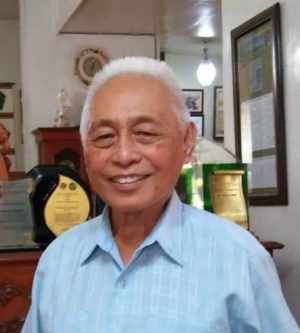
Dr. Romulo Davide
There is no stopping Dr. Romulo Davide, the multi-awarded national scientist from Argao, Cebu, from sharing his advocacy in uplifting farmers to become the scientists of their own communities.
Now in his 80s, Davide continues to do regular trainings and visits to different towns and cities for his initiative, the Farmer-Scientist Training Program (FSTP).
The Cebu Provincial government recorded a total of 2,426 farmer-scientists, who graduated from the FSTP.
Dr. Davide works as the Cebu Provincial Government’s agriculture consultant, paid with only one-peso a year.
The FSTP has since become the banner program of the Cebu Provincial Agriculture office to “promote agriculture and food security in the province.”
Davide is a Ramon Magsaysay awardee in 2012 where he was recognized for his “steadfast passion in placing the power and discipline of science in the hands of Filipino farmers, who have consequently multiplied their yields, created productive farming communities, and rediscovered the dignity of their labor.”
Davide is a native of Barangay Colawin in Argao, southern Cebu. He is the older brother of former Chief Justice Hilario Davide Jr.
Raised in a rural village, the farmlands of Argao became his first laboratory which eventually led him to the University of the Philippines Los Baños (UPLB).
It was in UPLB where he obtained his Agriculture degree in 1957. In 1962, he completed his Masters of Science in Plant Pathology from Oklahoma State University. In 1965, he earned his Ph.D. in Nematoloy-Plant Pathology from North Carolina State University.
In 1992, he discovered a nematode-trapping fungi that led to the development of BIOCON, “the first Philippine biological control product” used against pests attacking vegetables, fruits, rice and other crops.
BIOCON has proven to be a practical substitute for expensive and toxic chemical nematicides. Nematicides are products which destroy roundworms.
For this, he earned the title as the Father of Plant Nematology.
In 1994, he was awarded as “Outstanding Agricultural Scientist” by the Department of Agriculture. He utilized his award money to launch the FSTP in his home village of Colawin.
According to the Capitol, the FSTP is a systematized program where farmers are given technical assistance by experts/lecturers from the academe and government agencies with the goal of introducing new and scientific farming methods right in the farmer’s own farm or backyard to increase production.
It is an avenue where farmers meet scientists. It operates in the principle “from lab to land.”
“In FSTP, the learned experts in the field of agriculture interact with the farmers. They go where the farmers are, contrary to traditional programs of bringing the farmers downtown and conduct lectures,” the Capitol said.
On November 23, Dr. Davide will share about the FSTP in a scientific conference at the UP Open University in Los Baños, Laguna. His audience will be composed of young science communicators.
Dubbed “Couldn’t AGRI More: Harvesting S & T Knowledge,” the conference is organized by Masters of Development Communication students under the DEVC 263 Class (Scientific and Technical Communication) of Dr. Joanne Serrano, in partnership with San Miguel Corp.
The conference is open to the public, but there are only limited slots.
Disclaimer: The comments uploaded on this site do not necessarily represent or reflect the views of management and owner of Cebudailynews. We reserve the right to exclude comments that we deem to be inconsistent with our editorial standards.
